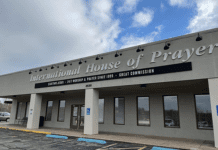In his veto message, Hogan said the bill “endangers the health and lives of women by allowing non-physicians to perform abortions. The only impact that this bill would have on women’s reproductive rights would be to set back standards for women’s health care and safety.”
RELATED: High Court Permits Kentucky AG To Defend Abortion Ban
The Supreme Court case that has prompted increased action on both sides of the issue regards a Mississippi law that prohibits abortion after 15 weeks’ gestation. The high court heard oral arguments in December about whether bans on pre-viability abortions are constitutional. Viability for an unborn child, or the ability to survive outside the womb, is typically considered to be several weeks after the 15-week limit set by Mississippi’s law.
Many pro-life and abortion-rights advocates believe the justices are likely not only to uphold the law but to reverse the 1973 Roe v. Wade opinion that legalized the procedure nationwide. Such a ruling by the Supreme Court would return abortion policy to the states.
In anticipation of a potential overruling of Roe, pro-life legislators and governors are seeking to enact abortion restrictions that would be law in their states if the high court issues such an opinion. In pro-life laws enacted this year:
- Arizona prohibited abortion after 15 weeks gestation in legislation signed March 30 by Gov. Doug Ducey.
- Idaho outlawed the abortion of an unborn child whose heartbeat can be detected in a bill signed March 23 by Gov. Brad Little. A heartbeat can be detected as early as five to six weeks gestation. Like a 2021 Texas law, the measure authorizes a private citizen – in this case, a family member — to bring a civil lawsuit against someone who performs a prohibited abortion.
- South Dakota barred mail-order abortion drugs in a proposal endorsed March 23 by Gov. Kristi Noem.
- West Virginia banned abortion based on the diagnosed disability of an unborn child in a measure signed March 21 by Gov. Jim Justice.
A 15-week abortion ban passed by both houses in Florida is awaiting Gov. Ron DeSantis’ signature. Other abortion regulations also are in the legislative process in several states.
RELATED: Texas Abortion Ban Is Saving 100 Unborn Lives per Day, According to New Data
In addition, Kentucky citizens will vote on a measure in November that says the state constitution does not protect a right to abortion or require the funding of abortion.
Meanwhile, legislators and governors who support abortion rights also are preparing for a possible reversal of Roe.
Colorado Gov. Jared Polis signed into law April 4 the Reproductive Health Equity Act, which guarantees the decision to abort an unborn child is a “fundamental right” in Colorado and bars state and local governments – and any other “public entity” – from interfering with a woman’s right to an abortion. Some observers contend the law goes so far as to legalize infanticide of newly born children.
New Jersey approved legislation in January to protect abortion as a fundamental right. The Vermont House of Representatives passed in February an amendment to the state constitution that would enshrine abortion rights. Vermont voters are expected to approve the amendment in November.
In the case being considered by the Supreme Court, Mississippi and many pro-life organizations, including the ERLC, asked in briefs filed with the justices that they reverse not only Roe but the 1992 Planned Parenthood v. Casey opinion that affirmed that decision.
This article originally appeared at Baptist Press.











